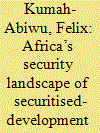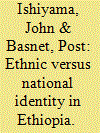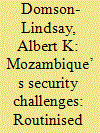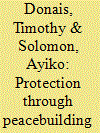|
|
|
Sort Order |
|
|
|
Items / Page
|
|
|
|
|
|
|
| Srl | Item |
| 1 |
ID:
185514


|
|
|
|
|
| Summary/Abstract |
Africa’s security landscape has been experiencing securitised-development practices through counterterrorism activities from donor countries engaged in the ‘Global War on Terror’ (GWOT). While some African governments continue to ‘benefit’ from the securitised-development agenda, critiques argue that there are human rights concerns that are connected to the practice of securitised-development. They have emphasised how some African governments and military actors involved in fighting the GWOT are also faced with human rights issues. To explore these issues, the article examines the securitised-development agenda in Kenya and Uganda and its impact on human rights. The article argues that the securitised-development practice is characterised by underlying contradictions involving the fight against terrorism and the accompanying human rights concerns in these countries.
|
|
|
|
|
|
|
|
|
|
|
|
|
|
|
|
| 2 |
ID:
185507


|
|
|
|
|
| Summary/Abstract |
As peace and security practitioners and scholars we seldom harness the expectations that a new year will bring a fresh start for people caught up in war, other forms of violent conflict and pressures that cause insecurity and distress. However, we know from past experience that where people feel insecure, a critical mass of people still have the energy to find innovative solutions to improve the well-being of people. Also in Africa, many good people share their knowledge of the many spaces in Africa, in the firm belief that wise leaders and other decision makers would find solutions to problems. In this edition, the authors illustrate in an exceptional way some of the efforts that are already bearing fruit towards security for all who dwell in the continent of Africa.
|
|
|
|
|
|
|
|
|
|
|
|
|
|
|
|
| 3 |
ID:
185513


|
|
|
|
|
| Summary/Abstract |
In this article, we examine the growth of ethnopolitical divisions in Ethiopia. Using recently released Afrobarometer data and comparing current levels of ethnonational identity with previous data released in 2013, we find an erosion in support for a national Ethiopian identity, and rapidly growing ethnonational identities among Oromo and Tigrayan respondents, but not Amhara. This suggests that the attempts by Prime Minister Abiy Ahmed to promote ‘Ethiopianess’ as a unifying principle for the country will face great challenges. In addition, although it is tempting to lay the blame for this growing ethnonationalism at the ‘feet’ of the ethnofederal system in Ethiopia (as many scholars have) this study cannot directly address the connection between ethnic federalism and ethnic conflict and instability. However, what is clear is that there is a growing sense of ethnonationalism (or the idea that ethnic identity is now more important than a national Ethiopian identity) for a significant part of the population and this is consistent with the expectations of the critics of ethnofederalism. This also suggests greater challenges to Ethiopian unity in the near future.
|
|
|
|
|
|
|
|
|
|
|
|
|
|
|
|
| 4 |
ID:
185510


|
|
|
|
|
| Summary/Abstract |
This article examines how the securitisation of COVID-19 helped the ZANU-PF government to consolidate power. It uses data collected from various document sources such as news outlets, social media platforms, and websites. Additionally, the researchers conducted informal interviews with Zimbabweans through social networking platforms. The study found that the measures the government (securitising actor) adopted to contain the coronavirus did not match the degree of the threat and noted glaring discrepancies between what the government said and its actions. In addition, the implementation of the COVID-19 measures indicates that the ruling party sought to achieve other agendas other than protecting the public (referent objects). The administration used extraordinary measures associated with curbing the spread of COVID-19 as a cover to decimate the opposition coalition, Movement for Democratic Change-Alliance (MDC-A), and consolidate power through the politicisation of food, harassment of those who broke the lockdown measures, prevention of anti-government protests, postponement of elections, and constitutional amendments.
|
|
|
|
|
|
|
|
|
|
|
|
|
|
|
|
| 5 |
ID:
185508


|
|
|
|
|
| Summary/Abstract |
The ongoing security crisis in Mozambique reveals the limitations of the mainstream statist approach to security promotion. Whenever there is social conflict or unrest, state authorities instinctively and routinely rely on military means to deal with it. However, this approach disregards the root causes of the problem, which are often the internal social, political and economic triggers of insecurity. Presently there are international security actors assisting the Mozambican government in dealing with the armed conflict in their country. As a contribution to the emerging body of work on Mozambique’s security challenges beginning in 1990, this paper adopts a critical security perspective in the analysis of the problem. The view is taken that there ought to be a balanced or broader approach to security. Although a military response is necessary for combating hostile forces, this effort should go in tandem with addressing the fundamental causes of the crisis. The paper argues that in Mozambique poor governance in the form of corruption, political patronage, marginalisation of minority groups, centralisation of power and other exclusionary practices are the major sources of the country’s insecurity. Some proposals are suggested to address these challenges.
|
|
|
|
|
|
|
|
|
|
|
|
|
|
|
|
| 6 |
ID:
185511


|
|
|
|
|
| Summary/Abstract |
Protecting civilians has been the primary raison d’être of the UN Mission in South Sudan (UNMISS) since civil war erupted in late 2013. Since then, UN efforts to protect vulnerable civilians have focused on a handful of so-called protection of civilians (PoC) sites. While they have unquestionably saved lives, the PoC sites have also absorbed the lion’s share of mission resources, severely limiting UNMISS’ ability to protect civilians elsewhere. The signing of the still-fragile Revitalised Agreement on the Resolution of the Conflict in South Sudan (R-ARCSS) has enabled a reconsideration of the UNMISS protection mandate in light of what remains an uncertain transition. Given the systemic constraints on the UN’s ability to project force in the name of PoC, we argue that UNMISS’ most constructive and lasting contribution to both protection and peace in South Sudan will be through sustained investments in inclusive local-level peacebuilding. Re-orienting the PoC mandate along these lines offers an opportunity to at least partially counteract the decidedly exclusive nature of the country’s current peace process, and to support bottom-up conflict resolution processes that could eventually interact in constructive ways with top-down dynamics.
|
|
|
|
|
|
|
|
|
|
|
|
|
|
|
|
| 7 |
ID:
185509


|
|
|
|
|
| Summary/Abstract |
The outbreak of COVID-19 has shifted from an urgent health issue to a major security threat requiring emergency measures that go beyond normal policies. Many African governments have exploited this pandemic as a deadly threat facing both the state and society to justify unprecedented precautionary measures that restrict people’s freedoms. Thus, the aim of this study was to analyse the current trend of the interventionist state and its socio-political implications in the medium and long term. Using a qualitative approach and literature review, this study examined the impact of securitisation of COVID-19 on African societies. The key findings reveal that most of the African responses to the pandemic were cases of non-traditional securitisation issues. Therefore, such findings are relevant for further studies to explore new threats and risks in the context of securitisation.
|
|
|
|
|
|
|
|
|
|
|
|
|
|
|
|
| 8 |
ID:
185512


|
|
|
|
|
| Summary/Abstract |
Academic literature gave less emphasis to the causes of insecurity of the society in Africa, and the role of the indigenous institutions to minimise the insecurity problems. Therefore, the purpose of this study was to examine the sources of insecurity and the roles of the afersata (indigenous communal court) in solving insecurity problems in Ethiopia focusing on the Semen and Begemider Governorate General. This Governorate General existed in Ethiopia from the periods 1941–1974 comprising various cultural groups within it. It included Amhara, Agaw, Kimant, Tigrie, Kunama, and Bete Israel groups. Qualitative methodology was employed for this research, in which archival sources available in the North Gondar Administrative Zone were significantly utilised. Besides, secondary and oral sources were thoroughly scrutinised. The finding shows that banditry, imposition of unfair taxes and fees, and mal-administration had threatened the security of human livelihood in Semen and Begemider Governorate General from the periods 1941–1974. Indigenous institutions such as Afersata played pivotal roles in minimising these security problems at least by identifying unknown offenders in the community.
|
|
|
|
|
|
|
|
|
|
|
|
|
|
|
|
|
|
|
|
|